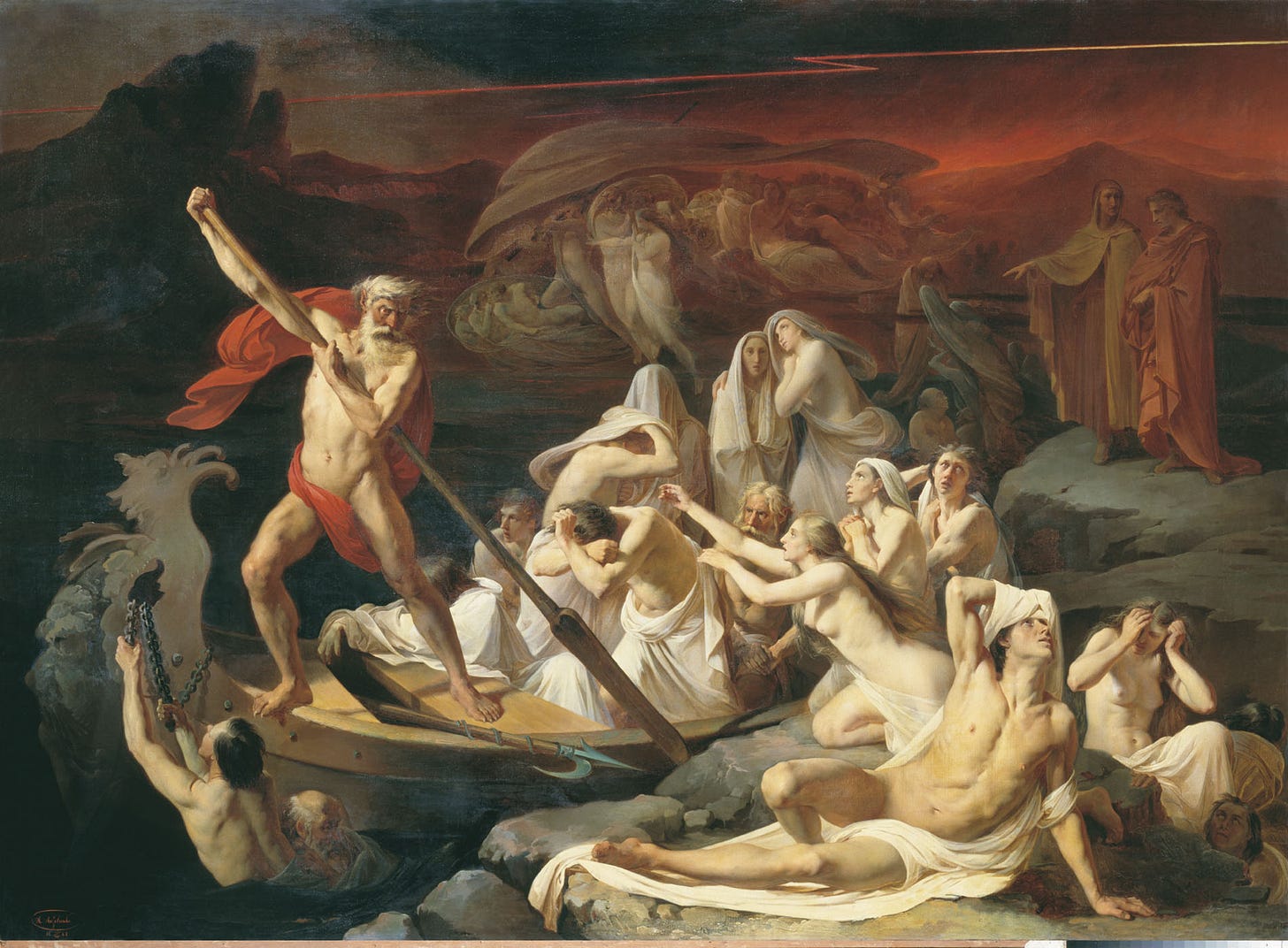This is a bonus essay for paid subscribers. It may be released publicly in the future, but you get first crack at it and a chance to comment and help shape its final form. Thank you for your support.
--Greg R. Fishbone, Mythology Disruptor
Usually in these essays, I present a thought or two I’ve had about mythology and how it might apply to our modern world. But today, I’m stepping up my game. By the end of this article, I will show you how to become a god.
First, let’s say you’re living in Ancient Greece. Although you don’t like to think about it, you know that you’ll someday need to make your way from the Land of the Living to the Land of the Dead. On your inevitable journey, you might expect to meet an elder figure in tattered robes who will ferry your soul across an otherwise uncrossable body of water. For your spirit to make this trip intact, you’ll need to have brought an obol coin along as payment.
Who is this mysterious figure?
In Greek mythology, Charon (or Kharôn) is a ferryman who carries souls across the Acheron on their way to the underworld realm of Hades. Charon is described as extremely aged, even for a god. As a child of Erebos and Nyx, the primordial gods of darkness and night, Charon is older than any of the Olympians.
Charon has cognates in Roman, Germanic, and Celtic mythologies, which suggests that stories about a Charon-type ferryman may predate the Proto-Indo-European migration into Greece and Western Europe. It’s safe to say that this character is hundreds or thousands of years more ancient than the oldest existing stories we have about him. We can therefore only ever speculate about his original identity, significance, and purpose.
So I’ve been doing a bit of speculation. Perhaps we can determine more about who Charon is by describing who he isn’t. Charon isn’t a god of death. He doesn’t decide who dies, or when, or how. He’s not a judge of the dead. He doesn’t decide whether a spirit deserves a good or bad resting spot based on their life’s work. He also doesn’t provide punishment, rehabilitation, or rewards for the souls that come into his care. Charon simply offers transportation, for which he requires payment.
Charon’s extreme age is another clue. The mainstream theory is that his name derives from charopós, a word relating to fierce or flashing eyes, but I prefer the theory that Charon’s name is related to the Greek word gérōn, which means “old person,” and forms the root of such English words as gerontology, the study of and medical practice related to old age. A consistent part of Charon’s description is his extreme age, while ancient sources hardly ever play up his flashy eyes.
The body of water Charon traditionally rows across is the Acheron, the Lake or River of Pain. Incidentally, the English word, ache, has Germanic roots but gets its modern spelling from 17th Century wordsmiths who thought the English language would look more classy with a Hellenic veneer. Regardless, it’s strange to think that ancient peoples would have believed that souls removed from the concerns of a physical body would continue to feel the pains of life. So what else could be going on here?
My theory is that thousands of years before Greek civilization formed, Charon was the answer to a riddle. Someday, an elderly figure will carry your spirit toward the Land of the Dead. Who is this mysterious figure? That’s you, of course. In the future, an older version of you will carry the essence and memories of your younger self down the River of Aches and Pains toward the Land of the Dead.
You are Charon.
When you become an elderly Charon, stooped with age, you’d better hope your young passenger stocked away a coin or two to ease the last part of your journey. That lesson may have been the originally intended purpose of Charon’s story. He may be best known today for being the Ferryman of the Dead, but I believe Charon, in his original form, was the God of Retirement Planning.
Congratulations! You are now an ancient god who predates the Greek civilization. Use your power wisely.



